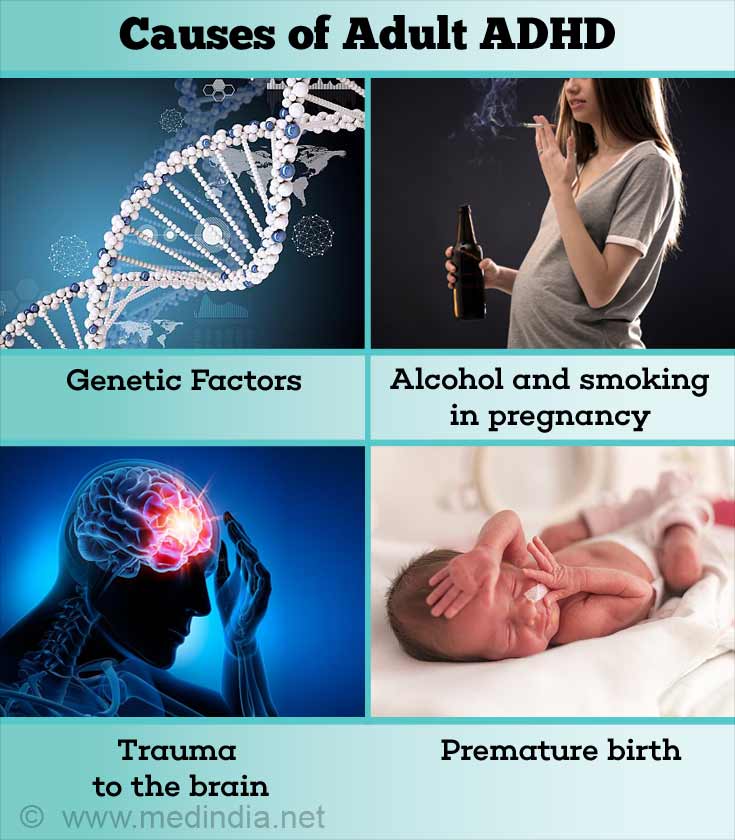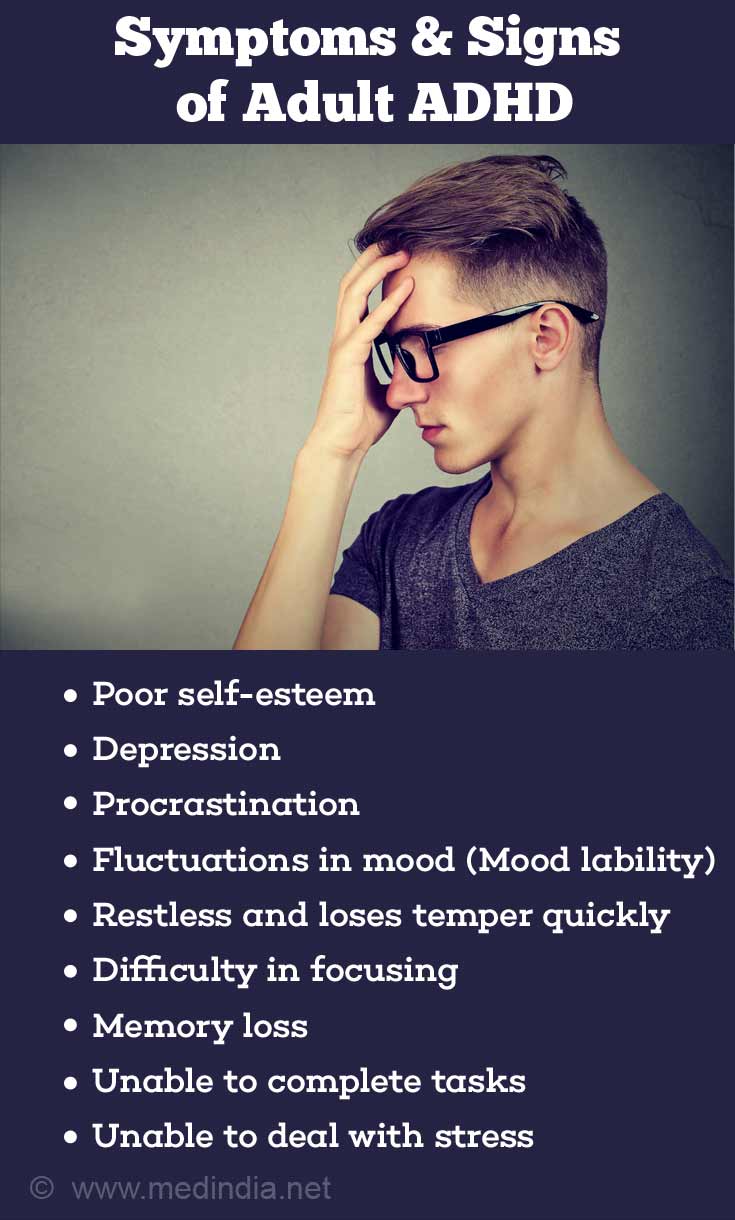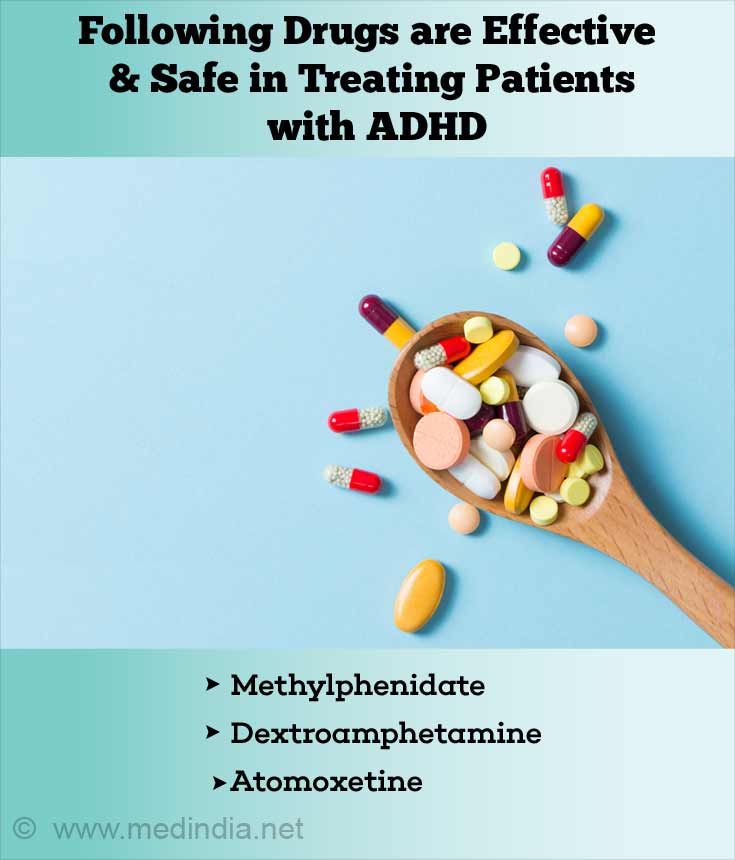- Rösler M et al. Attention deficit hyperactivity disorder in adults. The World Journal Biol Psych. 2010;11(5): 684-698. DOI: 10.3109/15622975.2010.483249. - (10.12688/f1000research.6780.2.)
- Adult attention-deficit/hyperactivity disorder (ADHD). Accessed on Mar 5, 2018.
- Bonvicini C, Faraone SV, Scassellati C. Attention-deficit hyperactivity disorder in adults: A sustematic review and meta-analysis of genetic, pharmacogenetic and biochemical studies. Mol Psych. 2016;21:872-884.
- Bernhardt H. Understanding adult ADHD. Accessed on Mar 5, 2018.
- Weiss M, Murray C. Assessment and management of attention-deficity hyperactivity disorder in adults. CMAJ. 2003;168(6):715-722.
- Moss SB et al. Attention deficit/hyperactivity disorder in adults. Primary Care: Clin Office Prac. 2007;34(3):445-473.
- Attention Deficit Hyperactivity Disorder. NHS Choices. Accessed Mar 5, 2018.
- Liebrenz M, Gamma A, Ivanov I et al. Adult attention-deficit/hyperactivity disorder: Associations between subtype and lifetime substance use – a clinical study [version 2; referees: 3 approved]. F1000Research 2016, 4:407 (doi - (10.12688/f1000research.6780.2.)
- Emotional Lability – Rapid changes in mood. Accessed Mar 5, 2018. - (10.12688/f1000research.6780.2.)
- Paris J, Bhat V, Thombs B. Is Adult Attention-Deficit Hyperactivity Disorder Being Overdiagnosed? Canadian Journal of Psychiatry Revue Canadienne de Psychiatrie. 2015;60(7):324-328. - (10.12688/f1000research.6780.2.)
- Faraone SV, Spencer TJ, Montano B. Attention-deficit hyperactivity disorder in adults. Arch Intern Med. 2004;164(11):1221-1226. doi - (10.1001/archinte.164.11.1221.)
- Castells X, Ramos-Quiroga JAntoni, Bosch R, Nogueira M, Casas M. Amphetamines for Attention Deficit Hyperactivity Disorder (ADHD) in adults. Cochrane Database of Systematic Reviews 2011, Issue 6. Art. No.: CD007813. DOI - (10.1002/14651858.CD007813.pub2.)
What is adult ADHD?
Adult attention-deficit hyperactivity disorder (ADHD) is a mental health condition in adults that affects the brain making the person hyperactive, impulsive and experiencing difficulty paying attention. Adult ADHD has an estimated prevalence rate of 2.5% to 4.9%.
Adults with ADHD develop symptoms in childhood and often may remain undiagnosed (generally seen in women) until adulthood. Nearly 65% of children affected with ADHD continue to suffer from the condition in their adulthood. There is an equal distribution of ADHD between genders but women are diagnosed later in their life. Invariably women are diagnosed with depression and may be underdiagnosed for ADHD since they tend to be diagnosed with attention disorders rather than hyperactivity or impulsive behaviour.
What are the different Types of adult ADHD?
Based on standardized rating scales used in diagnosis (see diagnosis section), adult ADHD can be classified as:
- ADHD-inattentive type – difficulty (score - 2 to 3) in 6 out of the 9 inattentive symptoms of the standardized scale
- ADHD-combined – difficulty (score – 2 or 3) in 6 out of the 9 symptoms listed in the hyperactive/impulsive type
- ADHD-hyperactive/impulsive – rare for patients to be classified
What are the Causes of Adult ADHD?
Adult ADHD is a complex condition where the exact cause is not clear. Genetics or the heritability component appears to be a significant cause of ADHD (30% - 50%).
Some of the causes of adult ADHD are listed below:
- Genetics – A major cause
- Complications during and after pregnancy
- Pregnancy – Alcoholism and smoking
- Environmental - Exposure to toxins, such as lead
- Neurobiological - Trauma to the brain
Certain risk factors increase the chances of getting ADHD:
- Pregnant women who smoke, use drugs or drink alcohol
- Premature birth
- Presence of blood relatives with ADHD
- Exposure to environmental toxins as a child

What are the Signs and Symptoms of Adult ADHD?
The symptoms for ADHD are based on the diagnostic and statistical manual of mental disorders (DSM-IV) criteria that are rated in the standardized scale from 0 (not at all or never) to 3 (very much or very often).
- Insufficient motivation
- Poor self-esteem
- Depression
- Procrastination
- Fluctuations in mood (Mood lability)
- Restless and loses temper quickly
- Difficulty in focusing
- Interrupts others very often and blurts out responses
- Speaks out of turn and inability to remain quiet
- Memory loss
- Very impatient
- Constant habit of misplacing or losing stuff
- Edgy or restless
- Does not pay attention to detail and is careless
- Unable to complete tasks
- Unable to deal with stress
- Takes unhealthy risks in activities (e.g. dangerous driving)
Women with ADHD suffer from sleep disorders, stress, overeating, and fibromyalgia.

How is Adult ADHD Diagnosed?
Adult ADHD is diagnosed in a similar manner as children based on the DSM-IV criteria for ADHD. The diagnostic procedure involves obtaining information about the patient from diagnostic evaluation forms.
Diagnosis of adult ADHD involves the following steps:
- Physical examination – This is required to eliminate contributing factors, such as problems arising from ADHD (bad nutrition, insufficient sleep, smoking, fractures, illegal use of drugs, lack of hygiene). A physical examination can detect weight loss in a patient. Medical conditions, such as thyroid abnormalities, neurological disorders could be a cause of ADHD symptoms. Side effects (glaucoma) or (hypertension) to medications may also be a cause for ADHD.
- Assess present and past symptoms – The clinician should record all symptoms that occurred in childhood (before 7 years of age) and in the past 6 months. It is important to obtain a record of childhood symptoms when determining adult ADHD. The significance of childhood symptoms can be assessed with self-report rating scales (Adult inventory – 4, Adult self-report inventory – 4) as well as with the help of school records where the symptoms would have been recorded in report cards as “always interrupts others, doesn’t sit still, lacks focus, etc.” This is particularly useful since patients may not remember past details very easily. It is important to have a family member or friend (collateral informant) to provide details of the symptoms since ADHD patients may not be reliable in their accounts.
- Obtain psychiatric and developmental records – These records are essential to rule out the influence of other psychiatric conditions on the symptoms. Since genetics is a main cause of ADHD, the psychiatric history of the family should be considered to evaluate the patient.
Psychoeducational testing is helpful in patients suspected of learning disabilities. Combined neuropsychological and electronic testing may be beneficial but they are not accurate if used alone. However, there appears to be a tendency to over-diagnose ADHD and as a result, over-treat the condition.
How is Adult ADHD Treated?
Treatment of ADHD involves 3 strategies:
- Educating the patient – Based on the symptoms, psychiatric and developmental history as well as ratings, the physician can explain what aspects indicate ADHD in a patient.
- Psychological management – The benefits of psychological treatment have not been confirmed. They are helpful in combination with medications that are used as first-line treatments. Coping strategies, cognitive behavior therapy and skills training help to improve ADHD symptoms in patients. Support groups provide social contacts and education to ADHD patients.
- Medications – These are effective and safe first-line modes of ADHD treatment. Majority of ADHD adult patients are treated first with stimulants (e.g. methylphenidate and dextroamphetamine) while only approximately 12% are treated with antidepressants. The appropriate dose is determined over a week when there is optimal symptom reduction and manageable side effects. The US Food and Drug Administration recently approved the first non-stimulant anti-depressant drug atomoxetine (Strattera) to treat ADHD. Mixed amphetamine salts (MAS) were found to be effective in short-term ADHD treatment, showing reduction in severity of symptoms.

Patients administered with medications are monitored monthly till their symptoms stabilize. Following that, patients are monitored once every 3 months for side effects, adverse situations, and other symptoms.
How is Adult ADHD Prevented?
Due to the genetic component, it is hard to prevent ADHD. Appropriate lifestyle measures, such as taking notes to remind oneself of tasks to be completed each day and following a routine are certain ways to manage adult ADHD symptoms.








